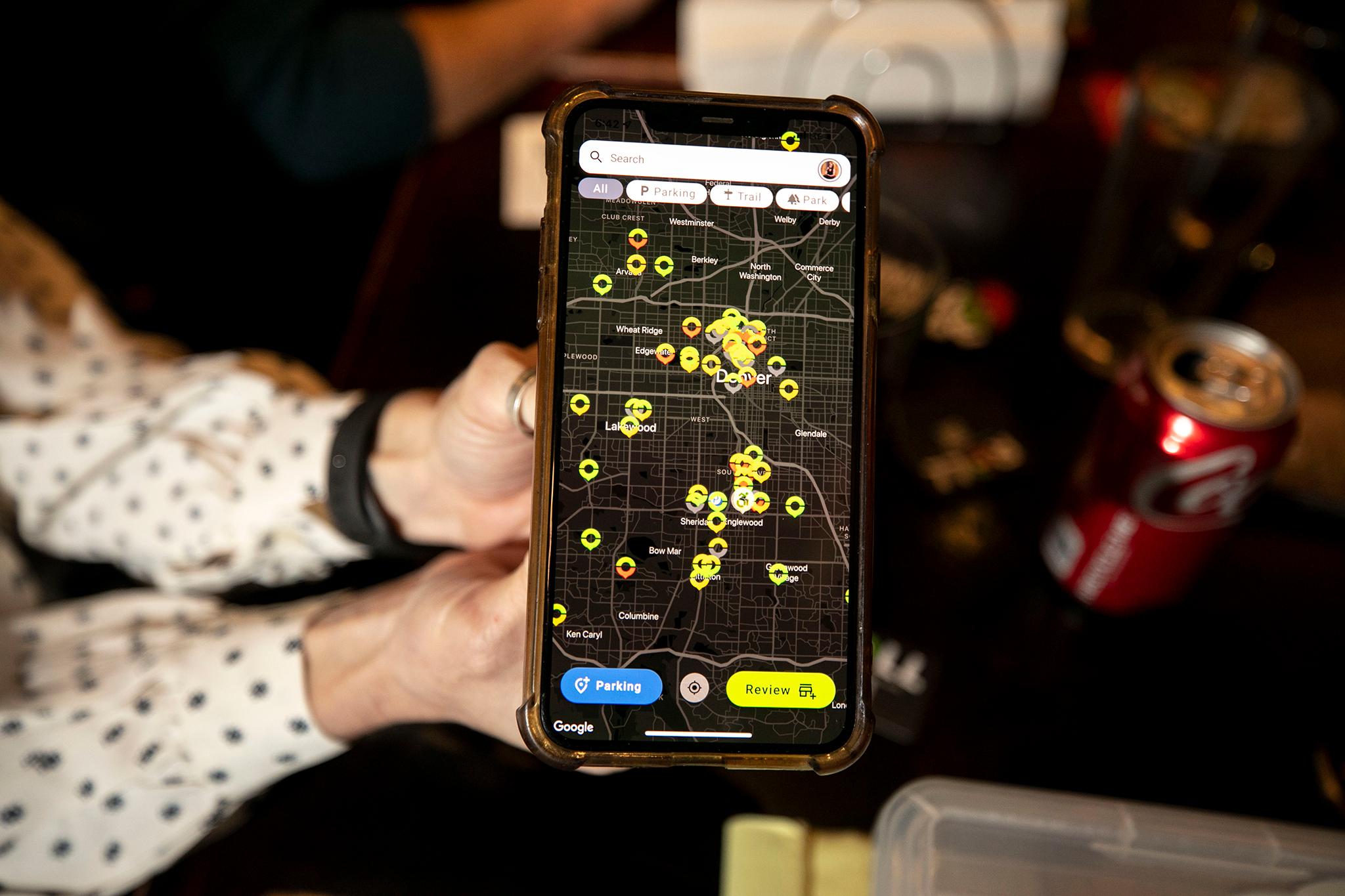
Trying to join her friends at a restaurant on a recent Friday required real effort from Allyson Mallory.
First, she had to find a handicap-accessible parking space at a grocery store across the street. Then she had to maneuver her electric wheelchair across snow-covered sidewalks — or try anyway. Finding they had not been shoveled, she had to turn around, go back and find a better path.
All that to get to a pizza joint designed to be wheelchair-friendly. Ordeals like that have led to the creation of a new app that offers accessibility reviews of local businesses open to the public.
The app, called Roll Mobility, was designed by four people — three Coloradans and another expert based in the UK. Launching this month, it gives people in chairs information about the accessibility of different spaces before they go out.
On that recent Friday evening, Mallory, her friends and a few app creators met a reporter at Brewability, the pizzeria/brewery catering to the area’s disabled community and their friends, to talk about what led to the creation of Roll, and the challenges of life around Denver for people who use wheelchairs.
Also at the table were John Vcelka, who plays adaptive lacrosse and sells tricked-out wheelchairs to meet the specific needs of each user; Quinn Brett, a renowned mountain climber whose fall made her the subject of a documentary; and Chris Layne, the former Ms. Wheelchair Colorado, a retired nurse who now advocates for accessibility for those in chairs.
When Layne was hiking in Clear Creek Canyon in Golden with her teenage son and a few of his friends to celebrate his birthday in 2016, she lost her footing on loose rocks and fell 80 feet. After spending months in two hospitals — one surgical, the other rehabilitative — she was classified as paraplegic. Now she shares resources on making life full, wheelchair or not, with as many of the state’s seven percent of people with mobility limitations as she can reach.
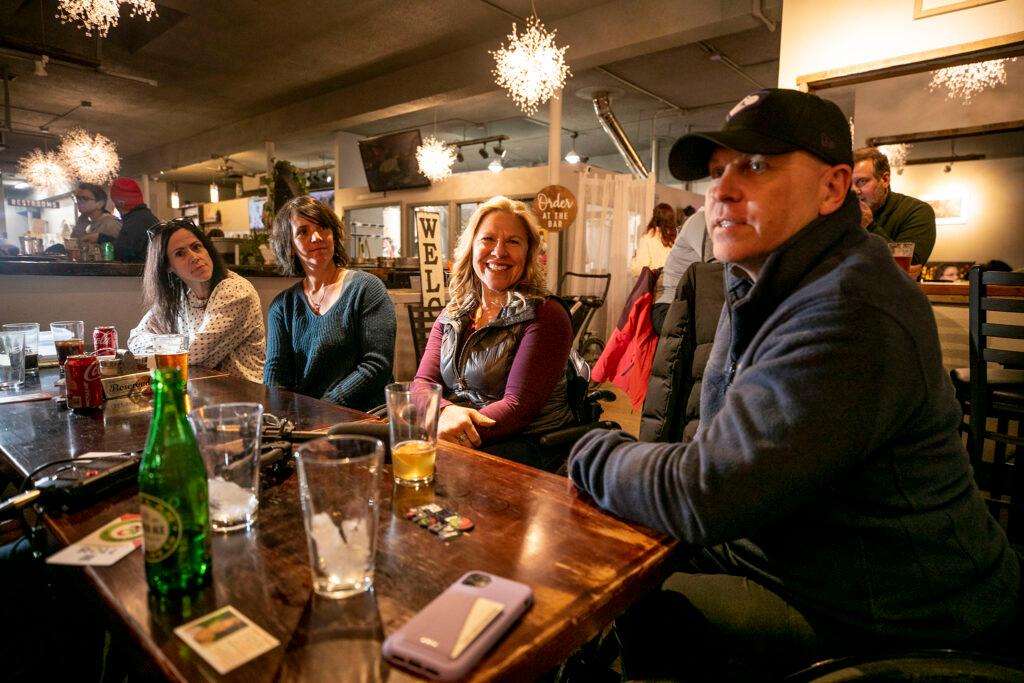
“You can travel, you can ride a trike, you can get a motor and go around the world. You can do whatever you want in a chair,” she said. “You just have to find the right tools and be up for it.”
But it helps to know what tools are needed. The restaurant and bar Brewability, which employs and is designed to welcome people in chairs and with issues such as autism, Down syndrome, and vision and hearing impairments, tries to provide many of those needed tools along with a welcoming atmosphere.
And now, Roll Mobility, a new app that launches this month, has arrived to let people in chairs know — before they go to the trouble of showing up — if venues (and their restrooms) will accommodate them and their chairs.
“You have to be a researcher to know if the place will be accessible or not. You’re calling ahead, you’re asking friends if they’ve been there or not,” said Allyson Mallory.
She now works as Director of Curriculum, Instruction and Professional Development with Mapleton Public Schools, a step up from roles she held before her fall as an elementary school teacher and, later, principal. She became friends with Layne and the others at the table because of their shared experiences.
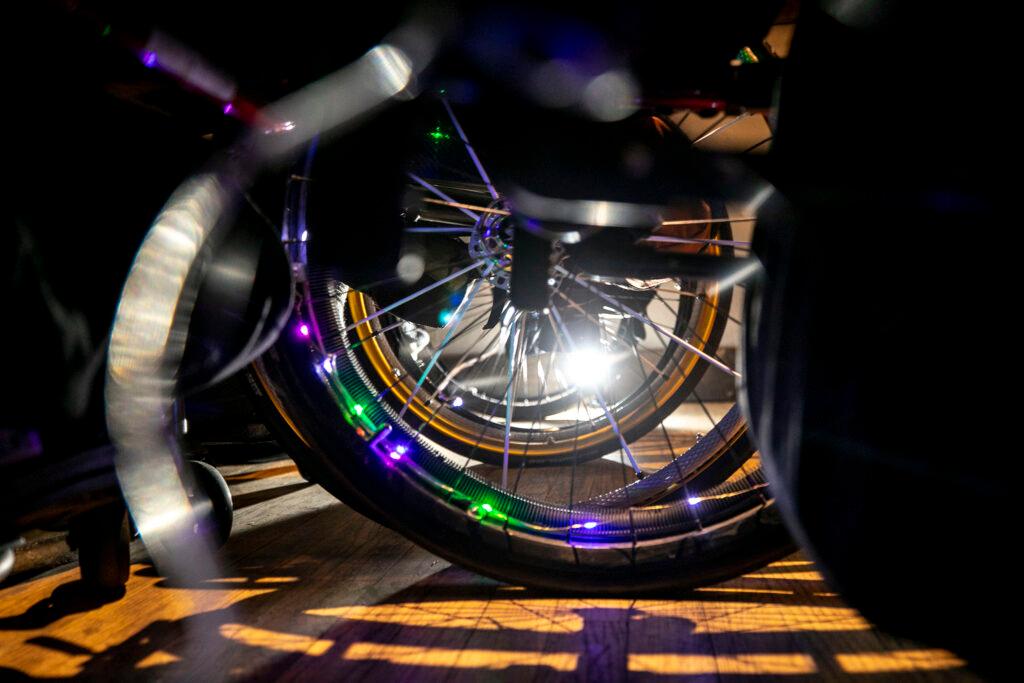
Mallory, a measured, eager and outspoken woman in her 40s who is slender with brown hair and a flair for straight talk, was paralyzed six years ago snowboarding at Keystone’s Area 51 terrain park. She has since had her house re-outfitted with larger closets, vinyl floors, and lower cabinets.
To conserve her energy for other tasks, she now gets her groceries delivered. To get out and see friends, she said planning ahead can be so much work that it sometimes becomes prohibitive.
“You’re just carrying this cognitive weight on your shoulder,” she said. “That, for me, has prevented me from going out into the world.”
Getting out to see Chris Layne, 53, who showed up in a vivacious mood with blonde hair and bright pink fingernails, and other friends was a case in point.
“Just tonight, I parked across the street at King Soopers because all the handicap-accessible spots were full,” Mallory said. “Then I’m rolling on the sidewalk, only to encounter snow that hadn’t been shoveled. So then I had to backtrack across the street and then, you know, it just adds a lot.”
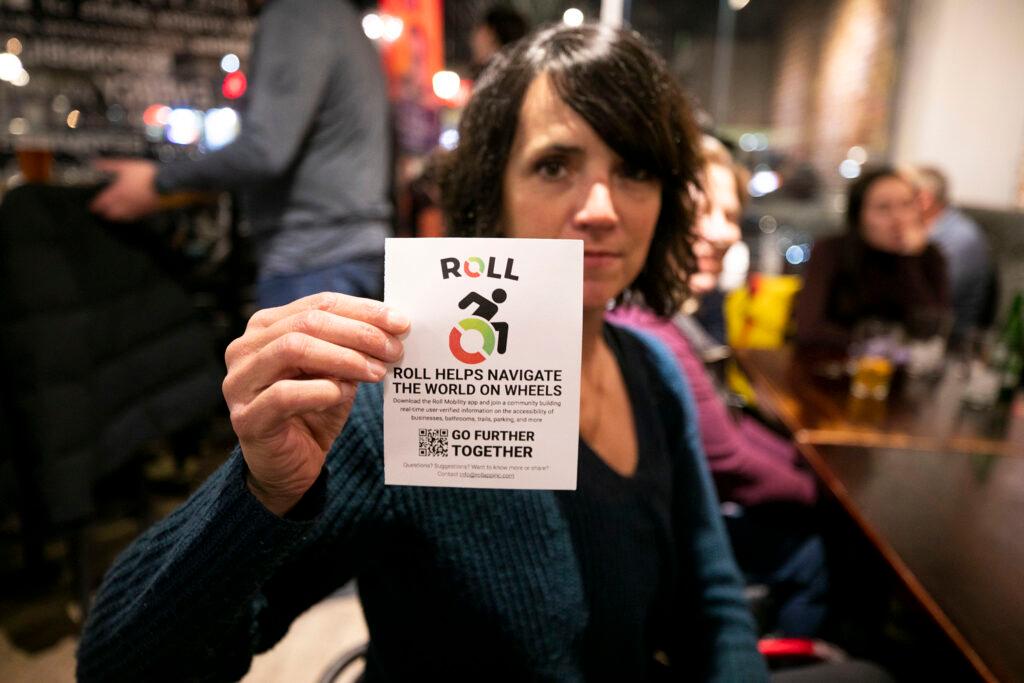
Roll Mobility is 'like a Yelp for people who use a wheelchair or have accessibility issues'
Help for such issues could come in the form of the new app, officially launched Feb. 11 at Brewability. One of the creators is Laura Sporrer, a marketing professional in Denver whose interest in mobility issues began after her father was diagnosed with Lou Gehrig’s disease, changing him from outdoorsy to sedentary.
Sporrer said the app answers questions about things like whether one will be able to sit at a table that isn’t three feet taller than their head, or whether they will be able to wheel their chair into the restroom without getting stuck.
“It’s like a Yelp for people who use a wheelchair or have accessibility issues,” said Sporrer, who at the Brewability hang was jovially encouraging people to try the bar’s pizza with arugula topping and an in-house brewed beer. “So you can pull up the app and find a restaurant, or bar, park, or business of any sort and find out if somebody has rated it and see if it is accessible, or understand the accessibility restrictions a little more clearly.”
Another app feature: “If you go out and experience someplace and have issues, you can record that as well to help inform other people who have accessibility issues.”
So far, hundreds of people have tried it after feedback received in focus groups earlier this year resulted in some improvements. Now, venues are given two ratings, on a scale from one to five stars — one for the accessibility of the space overall, the other for bathroom accessibility. Places that rank highly then might receive a sticker with a green, black and red logo of a wheelchair in the middle, around which the words YOU ARE WELCOME HERE are printed.
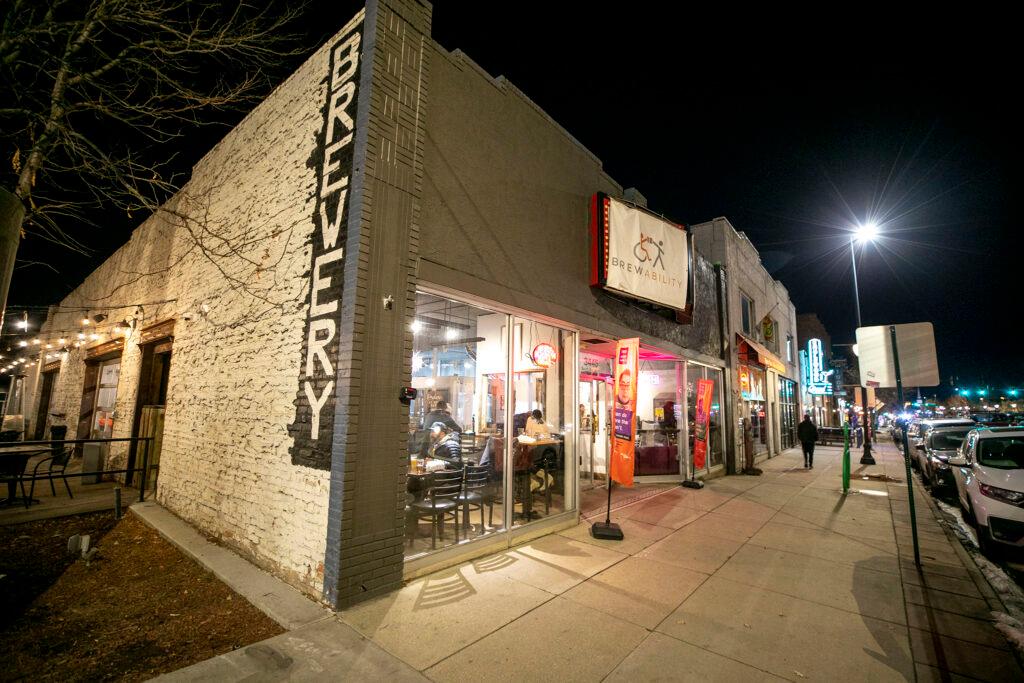
Brewability is accessible for their customers and staff like
Layne, Mallory, and some of the other friends can tell the difference between an accessible and an inaccessible space, and they know which side Brewability falls on, as does the owner.
“We have a marble wall, wiggle seating, a weighted lap pad, noise-canceling headphones for adults and kids,” said Tiffany Fixter, a former special education teacher who opened the bar in 2016.
After trying a few other locations, she settled in Englewood three years ago at a location close to Craig Hospital (which serves people with spinal cord and brain injuries) and to public transportation.
“We added the curtains in case someone has a meltdown or a seizure they have some privacy,” Fixter said, touring guests around the lively, noisy, dark space.
Hard-of-hearing guests can still enjoy music she said, indicating a singer performing live that night.
“We plug her into the floor, and the entire floor vibrates, so people who are deaf and hard of hearing can experience music,” Fixter said. “It’s bone conduction technology, it goes straight through your bones and touches your ear.”
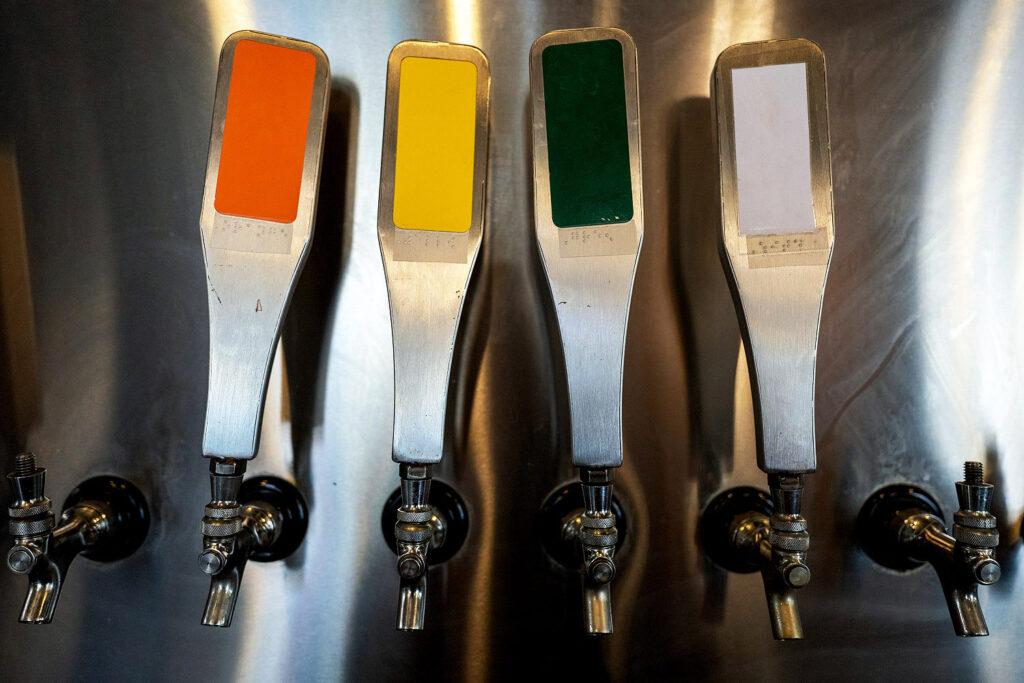
And that’s not all, she added: “We have card games with Braille on them ... anything that anyone might need while they are here.”
That also includes the bar staff, many of whom have vision, hearing or cognitive challenges. That night, a man with high-functioning autism was brewing a batch of beer; another man with Down syndrome was washing dishes; and 24-year-old Juliana Trunfio, who developed optical atrophy at age six, was waiting tables. Her condition limits her vision to seeing shapes, but not fine detail. Without inhibition, Trunfio took customers’ orders.
“Since there’s Braille on the taps, that’s what I generate off of,” she said, “so I don’t have to try to use my vision.”
Like Trunfio, Chris Layne, who was a registered nurse for more than two decades, has found workarounds. She stays active going swimming, exercising, and advocating for other people to get out every day.
“The good challenge is that I get to try so much, so many things, differently. Handcycle, ski on a mono-ski, resume some of the things I did before, just in a different way,” she said.
When she goes to her physical therapist’s office for dry needling to address the overuse of her rotator cuff muscles wheeling herself around, she tells waiting patients about how to get ramps at lower cost, and helps them adjust to their life-changing injuries.
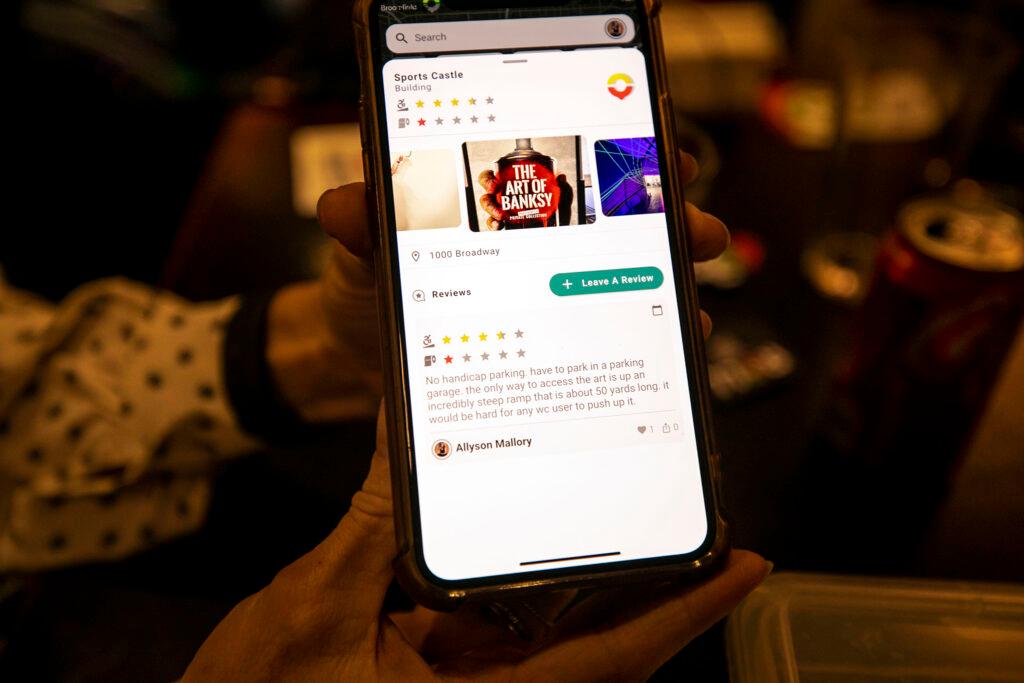
'We learn a lot from each other'
Making changes and staying active has helped Mallory remain optimistic as well. She’s been able to grow a new friendship circle along with new routines.
“I miss snowboarding, I miss jumping out of bed … feeling the sand beneath my feet,” she said. “On the flip side, I’d say my quality of life has been enriched because of the empathy I feel for others, because of the community we have, specifically in Denver. There are a lot of wheelchair users and we learn a lot from each other.”
Reflecting on her new circle of friends, she said: “We are able to be incredibly vulnerable. While I had a different community [before my fall], it wasn’t as strong as this one.”
The app, which is free and available for both Apple and Android devices, is expected to continue linking people in chairs to opportunities to get out and do things, and already, people in other states and countries have discovered it.
“That’s what’s great about Roll,” said Mallory, who, like Layne, goes for adaptive activities such as riding on a motorized cycle, “[is that] as we explore new trails, we are able to start sending info to other folks who don’t want to go through the hassle of calling the park to ask, ‘Are there obstacles that I need to be aware of?’”









